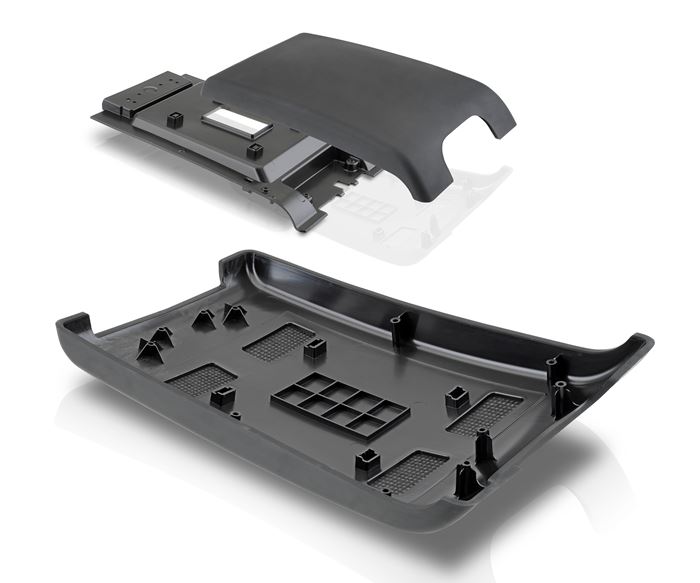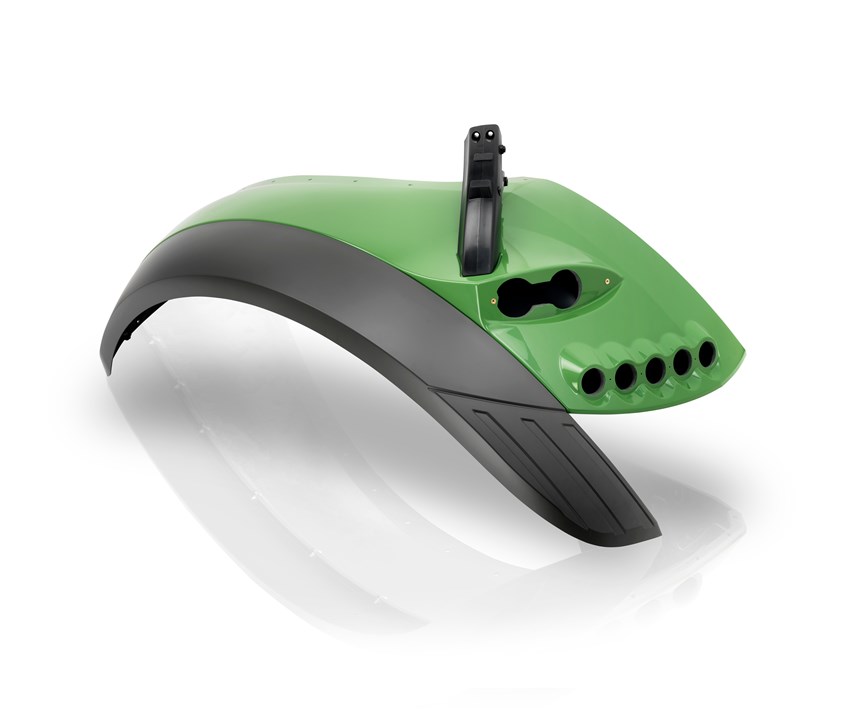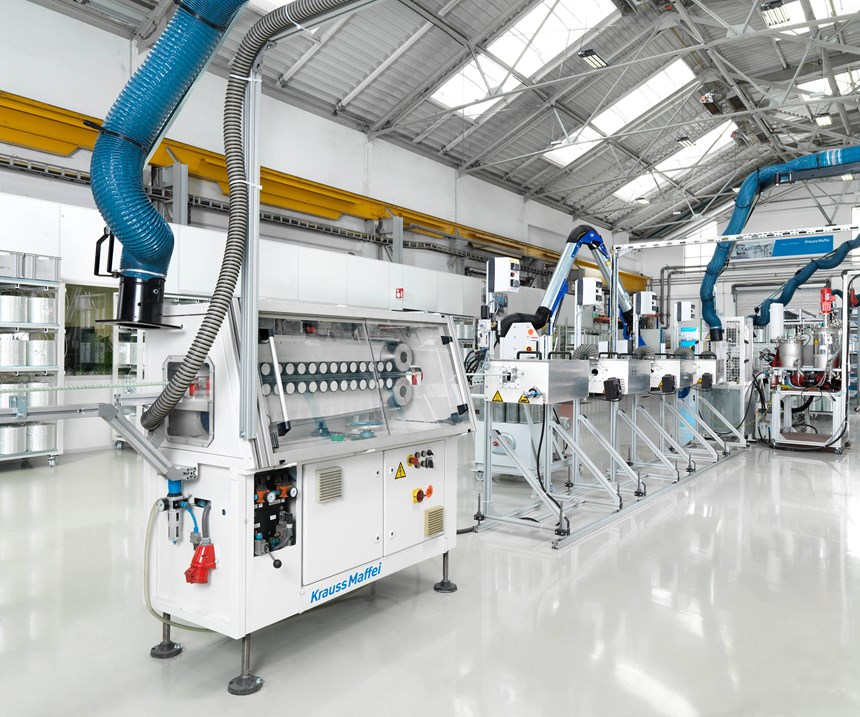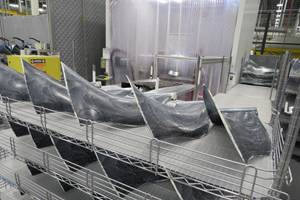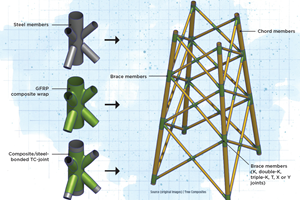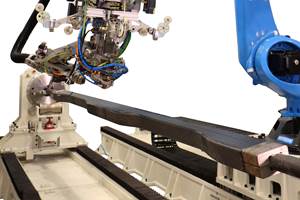JEC World 2019 preview: KraussMaffei
KraussMaffei (Munich, Germany) is focusing on its FiberForm process, pultrusion and unidirectional (UD) tapes at its JEC World 2019 booth, Booth R28, Hall 6.
KraussMaffei (Munich, Germany) is focusing on its FiberForm process, pultrusion and unidirectional (UD) tapes at its JEC World 2019 booth, Booth R28, Hall 6. Highlighting its expertise in developing and implementing series production-ready processes for fiber-reinforced lightweight construction the company is showcasing new processes and applications that are based on both thermoset and thermoplastic matrix materials.
To showcase the FiberForm process, three applications will be on display. The first is a continuous fiber-reinforced thermoplastic series-produced lightweight component with a unit quantity of over 1 million per year. It is manufactured through the FiberForm process, which uses intelligent automation solutions and heating technology optimized for the injection molding process to reportedly produce cycle times from below 60 seconds. For this application, the process involved forming and back-injecting organosheets only 0.5 mm thick, said to ensure the required stiffness with a low dead weight and contributing to weight savings of up to 4 kg/vehicle.
A second component was the result of a research project with the Dresden University of
Technology and demonstrates the use of recycled materials such as recycled carbon fibers and remanufactured compounds. An injection molding production technology called foam molding was implemented on a complex geometry and made it possible to produce thermoplastic sandwich structures with fiber-reinforced cover layers in a one-shot process.
The third application, a combination of FiberForm and swivel plate technology for
multi-component injection molding, is a center armrest for an automotive interior. It will be on
display in the Automotive Planet at JEC. The component’s use of the composite sheet is said to increase the rigidity and strength of the component, enabling the reinforcement ribs and the component itself to be designed with thinner walls, cutting weight by approximately 20% and cutting costs by around 15%.
KraussMaffei is also presenting its iPul technology from KraussMaffei Reaction Process Machinery. Launched in 2017, the iPul pultrusion system reportedly produces faster production speed compared to usual open bath processes. The new iPul series is KraussMaffei's first foray into the field of complete turnkey systems where the systems, process and mold technology are from a single source. The series features central control of important process parameters such as the output capacity and draw-off speed. The injection box and metering technology with a newly developed mixing head are said to make it possible to process completely different resins, including even polyurethane systems.
KraussMaffei will present a series component for a tractor side cover, created via the company’s long-fiber injection (LFI) process. The process is said to be suitable for large-format, complex and simultaneously thin-walled parts, with end applications including finishers for trucks, commercial vehicles and agricultural machines. A high
degree of automation is said to ensure short cycle times, and a fiber volume content of up to 50% is meant to produce high component stability and low weight simultaneously. LFI
components feature high temperature stability and excellent impact strength and have
surfaces that can be used directly off-mold.
KraussMaffei Berstorff’s UD tapes created through the FiberForm process are said to be well-suited for oil and gas applications such as thermoplastic composite pipes (TCP). A TCP system wraps UD tapes around plastic pipes and then melts the layers. This composite material and the orientation of the longitudinal fibers are said to give them the high pressure resistance needed for oil and gas applications.
In developing the UD tape technologies, KraussMaffei is working hand-in-hand with the
Fraunhofer Pilot Plant Center for Polymer Synthesis and Processing (PAZ, Schkopau, Germany). Since 2017, the Center has had a new UD tape system, the world's largest melt impregnation plant. The UD tape system reportedly achieves a manufacturing speed of up
to 20 m/min at processing temperatures up to 350°C.
Related Content
Plant tour: Albany Engineered Composites, Rochester, N.H., U.S.
Efficient, high-quality, well-controlled composites manufacturing at volume is the mantra for this 3D weaving specialist.
Read MoreNovel composite technology replaces welded joints in tubular structures
The Tree Composites TC-joint replaces traditional welding in jacket foundations for offshore wind turbine generator applications, advancing the world’s quest for fast, sustainable energy deployment.
Read MoreCompPair adds swift prepreg line to HealTech Standard product family
The HealTech Standard product family from CompPair has been expanded with the addition of CS02, a swift prepreg line.
Read MoreMFFD thermoplastic floor beams — OOA consolidation for next-gen TPC aerostructures
GKN Fokker and Mikrosam develop AFP for the Multifunctional Fuselage Demonstrator’s floor beams and OOA consolidation of 6-meter spars for TPC rudders, elevators and tails.
Read MoreRead Next
Developing bonded composite repair for ships, offshore units
Bureau Veritas and industry partners issue guidelines and pave the way for certification via StrengthBond Offshore project.
Read More“Structured air” TPS safeguards composite structures
Powered by an 85% air/15% pure polyimide aerogel, Blueshift’s novel material system protects structures during transient thermal events from -200°C to beyond 2400°C for rockets, battery boxes and more.
Read MoreAll-recycled, needle-punched nonwoven CFRP slashes carbon footprint of Formula 2 seat
Dallara and Tenowo collaborate to produce a race-ready Formula 2 seat using recycled carbon fiber, reducing CO2 emissions by 97.5% compared to virgin materials.
Read More
.jpg;width=70;height=70;mode=crop)
